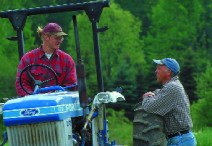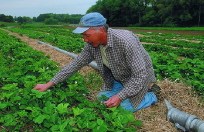Not quite. Instead of Brooks Brothers' worsted suits, try work boots, jeans, and a T-shirt. Thus attired, Bemis sits at a rolltop desk, entertaining a visitor on the second floor of his barn, about a mile up Monument Street from the schoolhouse where he was once a sixth-grader. The barn overlooks Hutchins Farm, about 60 acres of rich valley farmland that happens to be the largest organic farm in Massachusetts. It also happens to be where Bemis has spent most of his adult life growing fruits and vegetables.
It wasn't necessarily planned this way. "I wonder if farming is ever totally intentional," he muses. "Often, it's done in an attempt to escape from other things. Years later, you find that you haven't escaped from any of those things, but dealing with nature has distracted you from the mundane issues of business. I've been captivated by the pleasures of growing things and working outdoors. What makes agriculture fun, and a lifelong pleasure, are the constant challenges, the problem-solving that growing crops presents."
"New challenges every year?" asks the visitor.
"Every day," says Bemis, grinning.
Hutchins farm itself started somewhat whimsically. Bemis's maternal great-grandfather Charles Hutchins, an Episcopal minister in Medford, Massachusetts, was passing through Concord one day and stopped at an auction, expecting to pick up a few miscellaneous items. "He ended up buying the farm," Bemis explains. (There were originally 220 acres, before tracts were sold to the town and to Harvard for its Concord Field Station.) Charles's son, Gordon Hutchins, class of 1902, was teaching school in Pennsylvania when he received paternal orders to enroll in the agriculture school at Cornell. He did so, and worked Hutchins Farm until 1954. Although Bemis's own parents moved to the farm, Bemis père built not crop yields but prefab houses, and local dairy farmers grew hay on the land until 1972, when Bemis's younger brother decided to try his hand at organic agriculture. Five years John's junior, Gordon Bemis had taken an independent study on organic farming and composting at Tufts, where he majored in engineering. ("He likes equipment," John explains.) By 1973 it was clear Gordon needed help, so John dropped out of architecture school at MIT (he finished a year later) and joined his brother in the furrows.
 |
| Leaning on one of the operation's eight tractors, he talks with Sam Hammer, a young farmer who works with the Bemis brothers. |
| Photograph by Jim Harrison |
Hence it was not bureaucratic but fraternal influence that made Bemis a farmer. His architecture degree has expressed itself in only one structure so far: the barn at Hutchins Farm. Part of that building is the farmstand, where the brothers sell organic produce from April through October to a dedicated clientele. Since they hardly ever advertise, 95 percent of their trade is repeat business, and an amazing 90 percent of the farm's revenue comes from the farmstand's receipts. "The fact that the grower is using organic, sustainable, nonpolluting methods really matters to these people," Bemis explains. "Retail prices at the stand are not dramatically different from the supermarket, and the quality is obviously far better--but the money goes to us, instead of to umpteen middlemen. We're proudest of our quality and freshness. No one sells fresher produce than we do. We pick virtually everything on a daily basis."
The farm grows more than 30 vegetables, including asparagus, broccoli, eggplants, leeks, peppers, potatoes, and tomatoes. Fruits include melons, blueberries, raspberries, strawberries, and 20 varieties of apples. There are 12 kinds of lettuce, and carrots that are, Bemis modestly notes, "highly regarded." "We probably could maximize our revenue by concentrating on blueberries," Bemis says. "They're a good cash crop, with a strong market for them opening up in England, and they contain a chemical that fights cancer. But we want a varied diet."
He means this quite literally. For six months of the year, 80 percent of what the Bemis family eats comes from the farm. Some restaurant patrons also get to savor Hutchins produce. Bemis calls Peter Davis, chef at Henrietta's Kitchen in Cambridge, "every small-scale farmer's best restaurant customer--he buys more vegetables directly from farmers than all other restaurants combined. There, they really do vegetables."
The basic concept of organic farming, according to Bemis, "is nurturing a healthy soil profile, because a healthy soil will produce a healthy crop. You do not feed the crop, you feed the soil." Organic farmers avoid herbicides, pesticides, and synthetic and petroleum-based fertilizers; they fertilize only with composted or cured manure, plus such minerals as soil tests may suggest. "There's compelling evidence that a diverse environment, nurtured to sustain life at all levels, can create a healthy product and significantly reduce pollution," Bemis says.
The farmstand's customer base has changed over the years. "In the early days, customers thought this was a farm run by hippies because it was all organic," Bemis recalls. "A lot of our business came from ethnic groups like Italians, who appreciate fresh food. There were some macrobiotic eaters, and other alternative groups that focused on food as a cure for their problems. Then the macros moved to western Massachusetts and the ethnics dispersed, yet our total sales have multiplied 20 times." Last year was the farm's best by a long shot. "Today it's more salad greens and other items eaten raw. We get the people who are still preparing food for themselves," Bemis says. "The view of the valley, and seeing the produce, are a break in their day. For some, coming here is a kind of ritual."
The Brothers Bemis lease the farm's land from their family's partnership, and 30 more acres from other landholders. They plant 40 acres of vegetables and 10 acres of fruit. For the last 12 years a third farmer has joined them in tilling the soil, but this summer he departed for a farm of his own. "Most of the talent pool in organic agriculture looks at 40 acres as a nightmare," says Bemis. "It's possible to earn a living on eight to 10 acres and maintain control of their lives; they see a larger operation as dominating their lives."
 |
| Bemis kneels on straw mulch beside an irrigation pipe to monitor frost damage to the farm's strawberry crop, which covers an acre. |
| Photograph by Jim Harrison |
Youth is of the essence, since the Bemis brothers are now in their fifties. "Small farms make a profit margin that's pretty directly related to the physical output of the principals," Bemis says. "You have mined your bodies. Physical deterioration means you have to be realistic. Younger bodies and minds are needed to make the farm sustainable."
The family began to consider the future of the farm several years ago. They protected the farmland by selling the development rights to the town of Concord and the state. They would like Hutchins Farm to continue as an organic endeavor, which demands business acumen. "Today," Bemis says, "success in farming requires more attention to business than to actually growing things." But there's also the continuous action in the fields and greenhouses to keep up with. Leeks get started in January, there are hothouse tomatoes for June and July sales, and waves of plantings all year long. December is the only month when nothing is growing.
Except the people, who never stop. In 1980, Bemis married Jamie Kelley, whom he met at an organic-gardening meeting. She started Gaining Ground, a nonprofit farm in Concord that cultivates four acres at Thoreau's birthplace, said to be the oldest continuously farmed piece of land in America. Their son, Taylor, will matriculate at Colby College this fall. Daughter Charlotte is at Concord-Carlisle High School. Taylor has worked on the farm and liked it. As a high-school sophomore, he took a test and scored higher on farming aptitude than anyone in the school's history. Still, Bemis allows, it's too early to say if the kids will farm. In the meantime, he and his brother will continue much as they have. "The ultimate skill on a diverse farm is learning to be an incredibly competent juggler," Bemis explains. "The need to feel fulfillment in finishing something, or doing something perfectly, disappears. It's replaced by the satisfaction of keeping a lot of things going forward and enjoying the people you interact with."





